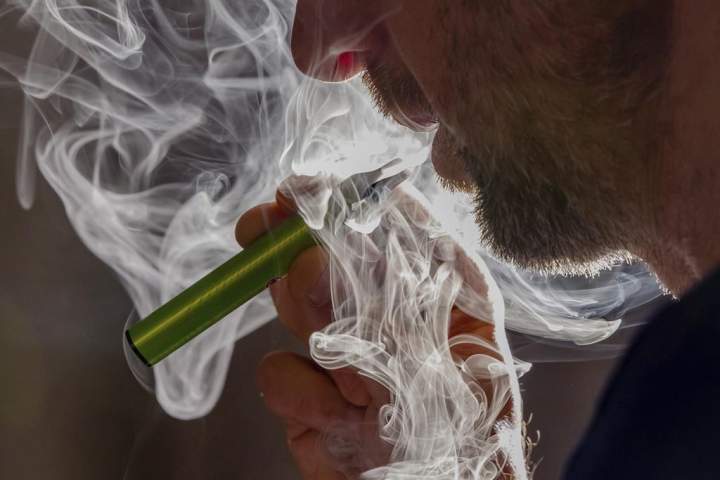Health
Canadian Task Force Urges Caution on Vaping for Smoking Cessation

New guidelines from Canada emphasize that vaping should be considered a last resort for individuals attempting to quit smoking. Published on March 4, 2024, in the Canadian Medical Association Journal, these recommendations are the result of research by the Canadian Task Force on Preventive Health Care. The task force aims to provide effective strategies to help Canadians reduce or eliminate smoking altogether.
Under the new recommendations, healthcare professionals are encouraged to inquire about their patients’ smoking habits and collaborate on personalized cessation plans. These plans may include primary care advice, individual or group counseling with trained cessation specialists, nicotine replacement therapies such as gums or patches, and prescribed medications.
Dr. Eddy Lang, a professor in the University of Calgary‘s Department of Emergency Medicine and a member of the task force, stated, “Smoking is probably the greatest preventable cause of death and illness in Canada.” He emphasized the importance of helping individuals navigate the various cessation options available to them.
The task force cautions against certain cessation methods with little evidence of effectiveness, including acupuncture, hypnotherapy, and electrostimulation. According to the latest data from Statistics Canada, approximately 12 percent of Canadians aged 25 and older currently smoke, compared to 4 percent among those aged 15 to 19. The Canadian Tobacco and Nicotine Survey revealed that 31 percent of smokers aged 15 and older attempted to quit in the past year, with around 62 percent doing so without assistance.
Concerns about vaping have been voiced by health experts, despite previous claims that e-cigarettes are less harmful than traditional cigarettes. Health agencies, including Johns Hopkins Medicine, advise against vaping, noting that it remains “not safe” due to the presence of thousands of chemicals. Vaping products contain nicotine and heavy metals like nickel and tin, and their vapor harbors carcinogens comparable to those found in cigarettes.
Dr. Lang expressed concerns about the long-term safety of e-cigarettes. “We don’t know exactly what is going to be the long-term consequences of using nicotine via e-cigarettes for a prolonged period of time,” he said. The task force recommends that e-cigarettes only be considered when other cessation methods have failed or if patients are unwilling to try alternatives.
The Alberta Lung Association has raised alarms about the normalization of vaping among youth, particularly given the attractive flavors like bubble gum and fruit. Jamie Happy, health and motion coordinator at the association, remarked, “There’s a reason why flavored cigarettes are banned, and it is the same reason as these flavored e-cigarettes.”
According to the most recent Canadian Tobacco and Nicotine Survey, 47.5 percent of young adults aged 20 to 24 and 30 percent of those aged 15 to 19 have tried vaping at least once. Among those aged 15 and older who vaped in the month prior to the survey, 78 percent reported using e-liquids containing nicotine.
Research from the University of York and the London School of Hygiene and Tropical Medicine indicates a troubling trend: young people who vape are three times more likely to become smokers. The study also links vaping to increased use of other substances, including marijuana and alcohol, and warns of heightened risks of respiratory health issues.
Happy highlighted that vaping has become a replacement habit for many individuals. “People are replacing one habit with another because it doesn’t address the main issue, which is dependence on nicotine,” she stated.
Dr. Lang acknowledged the challenges of quitting smoking but expressed hope that these new recommendations will offer a comprehensive range of options to assist individuals in their efforts to quit. “We know it’s hard to quit; it probably takes more than two or three times, but the health benefits are extraordinary, so that’s worth pursuing,” he concluded.
-

 Science2 months ago
Science2 months agoToyoake City Proposes Daily Two-Hour Smartphone Use Limit
-

 Health2 months ago
Health2 months agoB.C. Review Reveals Urgent Need for Rare-Disease Drug Reforms
-

 Top Stories2 months ago
Top Stories2 months agoPedestrian Fatally Injured in Esquimalt Collision on August 14
-

 Technology2 months ago
Technology2 months agoDark Adventure Game “Bye Sweet Carole” Set for October Release
-

 World2 months ago
World2 months agoJimmy Lai’s Defense Challenges Charges Under National Security Law
-

 Technology2 months ago
Technology2 months agoKonami Revives Iconic Metal Gear Solid Delta Ahead of Release
-

 Technology2 months ago
Technology2 months agoSnapmaker U1 Color 3D Printer Redefines Speed and Sustainability
-

 Technology2 months ago
Technology2 months agoAION Folding Knife: Redefining EDC Design with Premium Materials
-

 Business2 months ago
Business2 months agoGordon Murray Automotive Unveils S1 LM and Le Mans GTR at Monterey
-

 Technology2 months ago
Technology2 months agoSolve Today’s Wordle Challenge: Hints and Answer for August 19
-

 Lifestyle2 months ago
Lifestyle2 months agoVictoria’s Pop-Up Shop Shines Light on B.C.’s Wolf Cull
-

 Technology2 months ago
Technology2 months agoApple Expands Self-Service Repair Program to Canada









